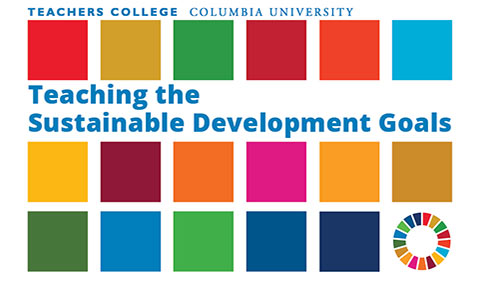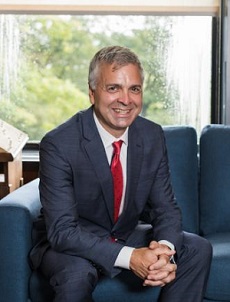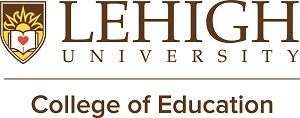Hybrid Track
Where: Online*
When: October 4 - October 24, 2021 with synchronous sessions on Tuesdays (October 5, October 12, October 19) from 8:00-9:30 pm EST
Description: In the hybrid track, participants will attend 3 synchronous sessions with Dr. Gaudelli to discuss the background of the SDGs as well as issues and challenges with the goals. These conversations will prompt educators to consider how to engage the goals with students. Participants will also read scholarship on the goals and interact with colleagues through discussion boards asynchronously. By the end of the professional development, participants will create a teaching toolkit for the SDGs in groups. This professional development should involve 20 hours of participants’ time in total.
Benefits:
- Connect and network with like-minded educators with diverse backgrounds
- Expand your understanding of SDGs through dialogue with educators, Professor Bill Gaudelli and Lehigh's College of Education faculty
- Receive written and verbal feedback from Lehigh's College of Education faculty
*Participation in the synchronous sessions will require a strong internet connection and a headset.
Asynchronous Track
Where: Online
When: October 4 - October 24, 2021
Description: In the asynchronous track, participants are able to complete readings and assignments on the SDGs at their own pace and without attending synchronous sessions. Participants will watch Dr. Gaudelli’s lectures, read scholarship on the goals, and interact with colleagues through discussion boards. Dr. Gaudelli and his course assistant will have available and optional online office hours to further support your work. By the end of the professional development, participants will create a teaching toolkit for the SDGs individually. This professional development should involve 20 hours of participants’ time in total. This track may appeal to international educators in particular given potential differences in time zones.
Benefits:
- Connect and network with like-minded educators with diverse backgrounds
- Expand your understanding of SDGs through dialogue with educators, Professor Bill Gaudelli and Lehigh's College of Education faculty
- Receive written and verbal feedback from Lehigh's College of Education faculty
Faculty
Dr. William Gaudelli
Professor and Dean of the College of Education
Lehigh University
William Gaudelli, Ed.D. is the 8th Dean of the College of Education at Lehigh University. Dean Gaudelli’s career spans more than 25-years as a classroom teacher, researcher, professor, and seasoned administrator. A prominent international scholar, his research areas focus on global citizenship education and teacher education and development.
Dr. Gaudelli most recently served as the Chair of the Department of Arts and Humanities, at Teachers College, Columbia University. Prior to his department chair role, he was both a faculty member and program director of the social studies program. Before joining Columbia in 2006, Dr. Gaudelli held the position of associate professor and program supervisor at the University of Central Florida.
He has published over 60 scholarly pieces and three books. His research in global citizenship education and teacher development is widely read among scholars and has garnered over 900 citations on Google Scholar. In his latest book, Global Citizenship Education: Everyday Transcendence, he offers an analysis of global citizenship education in various locales.
Dr. Gaudelli is a frequent keynoter at international conferences and guest lecturer at various universities. Over the past five years, Dr. Gaudelli has given over 40 invited keynotes and talks, most recently in China, Italy, Israel, Thailand, Japan, India, Poland, Hong Kong, and South Korea. He has participated in panel discussions and conferences with UNESCO, UNAI, UNAOC, and WFUNA and a wide-range of professional organizations.
He co-founded the Global Competence Certificate (GCC) program in partnership with Asia Society and World Savvy, two global education non-profits. The GCC is built in an online environment that promotes high-touch interactions between faculty and students while leveraging digital technologies to enhance participant experience. Dr. Gaudelli was also elected to the South Orange-Maplewood School Board in 2011 where he served for over three years, part of the time as board vice-president.
Dr. Gaudelli completed his master’s degree in 1995 and his doctoral degree in 2000 at Rutgers University – Graduate School of Education in social studies education. He taught social studies in the Hunterdon Central Regional High School for ten years prior to moving into higher education.
Course Partner
Located in Pennsylvania's beautiful Lehigh Valley, Lehigh University is one of the nation's most distinguished private research universities. Through academic rigor, an entrepreneurial mindset and collaborative opportunities we challenge our students to become the leaders of the future. Lehigh's College of Education faculty offer high research activity in combination with nationally recognized graduate degree programs. We provide career-minded and research-productive students the exceptional training and experience they’ll need to become dynamic and successful leaders in industry and academia. We offer graduate programs in counseling psychology, educational leadership, instructional technology, school psychology, special education, and teacher education.
Testimonials
Overall:
“I was thrilled to discover that there are many resources I can use in the classroom, from examples of hands on activities to great lesson plans.”
“Through the videos, reading, and researching information for the teaching toolkit, I discovered numerous ideas and activities for teaching the goals in my classroom and introducing the goals to the younger students at my school.”
“I loved learning about the history of SDGs and how it is and always will be a work in progress and a proof that humans do care about each other. The critique of the goals was fascinating and eye-opening on the constant presence of the imperial norms in the world.”
“This course opened my eyes to endless opportunities within global education.”
Future Directions:
“I would like to start a sustainability committee at my school. I might also like to lead a PD group at my school on how to implement the SDGs 2015-2030 into the classroom curriculum.”
“I will plan all the units for my AP class around the global challenges the College Board recommends we cover and the SDG goals and targets I've learned about.”
“I plan on using the information as I work and coach the multi age middle school team in my building.”
“I cannot imagine teaching a foreign language without including SDGs.”
Examples of Participants’ Projects:
- High school interdisciplinary unit (Latin, history, and English/language arts) about global inequality (SDG Goal 10)
- Sixth grade science unit on clean water (SDG Goal 6)
- Interdisciplinary project (Spanish and English) in which students create a PSA in both languages around hunger and responsible consumption and production (SDG Goals 2 and 10)
- Handbook on tackling inequality (SDG Goal 10) within US schools, e.g. tracking or leveling, for school community
- Upper elementary school lesson plan exploring issues of inequality (SDG Goal 10) such as immigration through young adult literature
- Middle school interdisciplinary lesson (math and English) on quality education for all (SDG Goal 4)
- Middle school interdisciplinary unit (social studies and science) on climate action (SDG Goal 13) leading to a capstone research project
FAQ
Who should participate in this professional development?
This professional development is open to educators of all backgrounds (grade level, subject area, independent or public schools, etc.). The UN’s Sustainable Development Goals allow for curricular connections at all levels. We invite all educators to consider what it means to engage students in thinking critically about global challenges.
What is unique about this professional development?
We’ve designed this professional development to allow educators to engage with meaningful content around the UN’s Sustainable Development Goals while also supporting goals they have for their unique school contexts. Course instructors provide feedback on projects created during the professional development individually or in groups that can be shared with or implemented in their schools. This professional development also awards participants 20 Clock Hours and 20 CTLEs.


